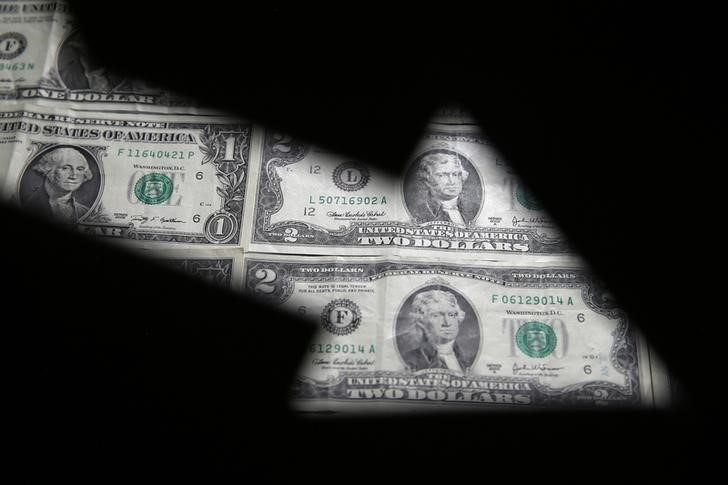[ad_1]

© Reuters.
Investing.com – The U.S. dollar edged higher in thin holiday-affected trade Monday, as traders digested the impact of last week’s central bank decisions, with a speech by Fed Chair Jerome Powell looming large.
At 02:00 ET (06:00 GMT), the , which tracks the greenback against a basket of six other currencies, traded 0.1% higher to 101.935, just above its recent one-month low, although activity is likely to be limited with the U.S. markets closed on Monday for the Juneteenth holiday.
Powell to testify before Congress
The U.S. Federal Reserve led the parade of senior central banks meeting last week to discuss monetary policy, and, as expected, paused its year-long rate-hiking cycle to assess its impact on inflation and the country’s economic outlook.
The also hinted at the likelihood of further rate increases ahead, with consumer prices still double its 2% target, but indicated the importance of upcoming economic data backing up these moves.
With this in mind, data on the U.S. as well as and the will be studied carefully this week, as well as Powell’s two-day before both Congressional chambers.
Beyond Powell, several other Fed officials are also set to talk this week.
Euro near one-month high, yen weak
Elsewhere, fell 0.1% to 1.0935, close to a one-month peak, while fell 0.2% to 141.52, with the yen bouncing off a near seven-month low versus the dollar, having fallen 1% on Friday.
The raised interest rates by 25 basis points on Thursday and left the door open to more hikes, while the rounded off the week by remaining the major central bank outlier, keeping its ultra-easy monetary policy.
Bank of England up next
edged higher to 1.2824, with the release of the data on Wednesday likely to be the main driver of sentiment ahead of Thursday’s meeting.
The BoE is widely expected to raise its main interest rate to 4.75% from 4.5% on Thursday, with the May CPI number expected to confirm that inflation in the U.K. remains more than four times above the central bank’s 2% medium-term target.
“We still think the rate of inflation is going to come down, but it’s taking a lot longer than expected,” Bank of England Governor Andrew Bailey said last week, after data showed that basic wages in the three months to April were 7.2% higher than a year earlier.
Elsewhere, fell 0.2% to 0.6866, while rose 0.3% to 7.1468, with the yuan retreating as markets priced in a potential cut in the benchmark loan prime rate on Tuesday.
The People’s Bank of China cut two interest rates last week, and is now widely expected to cut its as it attempts to boost its flagging economy.
[ad_2]
Source link
(This article is generated through the syndicated feed sources, Financetin doesn’t own any part of this article)
